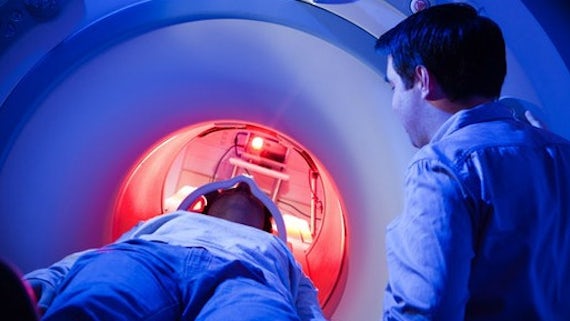Training the brain to treat depression
20 Gorffennaf 2018

A new study, led by researchers at Cardiff University, has highlighted the potential of real-time neurofeedback as an effective treatment for depression.
Depression is recognised as the largest contributor to disability globally, and around one third of people are thought not to respond to available treatments, such as antidepressants and talking therapies.
Professor David Linden, who supervised the study, said “There is a clear need to develop new treatments for depression, and our work suggests that functional magnetic resonance imaging (fMRI) neurofeedback has the potential to reduce depressive symptoms by over 40%.”
Neurofeedback is a technique that focuses on training people to regulate their own brain activity. It can enable people with depression to develop personal strategies to self-regulate brain areas and networks associated with mental imagery through the feedback signals that reflect their own neural activation patterns.
This can be enhanced by real-time feedback, where these signals are processed into images and fed back to the individual, so they can see what happens to their brain as they think certain thoughts or experience particular emotions.
Researchers conducted a randomised controlled trial to compare upregulation of brain areas involved in emotion processing (NFE) with an active control procedure involving upregulation of brain areas involved in higher visual processes (NFS).
The NFE group was guided to imagine positive images while the NFS group was guided to imagine relaxing scenes. This design gave participants of both groups the opportunity for self-regulation success and reward experience.
“We hypothesised that neurofeedback of emotion areas would lead to clinical improvements exceeding those seen in the active control group” said David Mehler, who was lead author of the study.
“What we actually saw was very little difference between the two groups, with both interventions showing a 43% reduction in depressive symptoms and an overall remission rate of around 38%.
“Importantly, the rate of reduced symptoms and remission was maintained and, in some cases, even improved at follow-up six weeks after the study with participants reporting positive effects on their quality of life. These types of sustained effects are important if we want to start thinking about how to transfer such an intervention into clinical practice.”
A whole brain analysis of the NFE group showed activation of the insula, which is a small region of the cerebral cortex, and the ventral striatum. Both the insula and striatal areas have been linked to positive reappraisal of emotions, which is an important element of psychotherapeutic treatments for depression.
David Mehler added “A key question is why the NFS group also show a substantial clinical improvement. This may be explained by a similarly rewarding experience and the type of mental imagery training participants engaged in, but we need further research in this area to provide a more definitive explanation.”
Professor David Linden concluded “These results are promising, although the interpretation of clinical improvements remains limited due to lack of a control group receiving only treatment as usual.”
“However, based on this research we would suggest that it is worth exploring fMRI-neurofeedback further in clinical trials, possibly in combination with psychological therapies.”
About the study
The trial, which was funded by the Medical Research Council through a Developmental Clinical Studies grant and supported by the National Centre for Mental Health, was completed by 32 patients diagnosed with moderate to severe unipolar depression on a current anti-depressant treatment with no change of dose in the preceding three months. Participants were randomly assigned to one of two groups, minimising for differences in age, gender, duration of illness and severity and medication type.
The research ‘Targeting the affective brain – a randomized controlled trial of real-time fMRI neurofeedback in patients with depression’ is published in Neuropsychopharmacology. Further information about other ongoing work on neurofeedback is available at www.braintrainproject.eu.